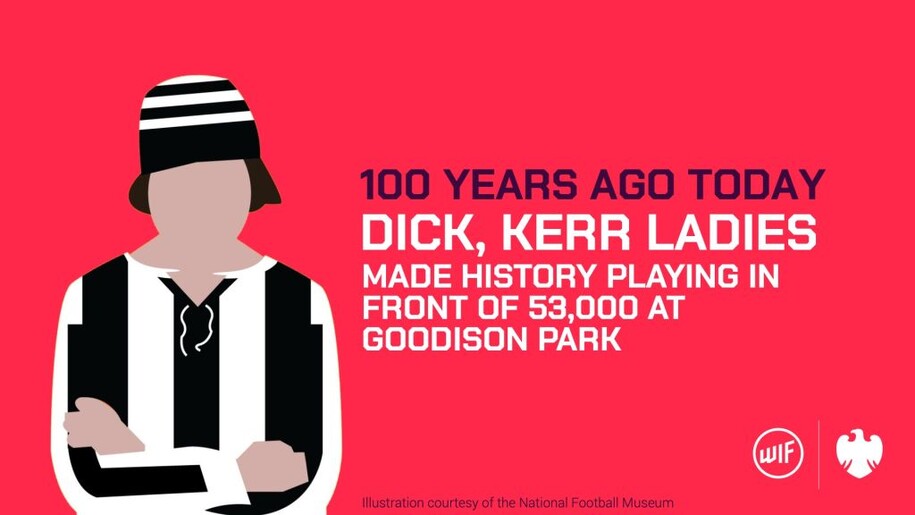News
Celebrating Dick, Kerr Ladies and their incredible Boxing Day achievement 100 years on
26 December 2020

2020 has not brought much cheer, but there is reason to celebrate this Boxing Day, which marks a very special moment in the history of women's football.
One hundred years ago a crowd estimated to be in the region of 53,000 packed in to Goodison Park to watch Dick, Kerr Ladies beat St Helen's on Boxing Day 1920.
Founded at Preston's Dick, Kerr & Co. munitions factory in 1917 to raise money for wounded soldiers, Dick, Kerr Ladies attracted 10,000 spectators to their first game at Preston North End's Deepdale ground on Christmas Day 1917, raising around £600.
Fast forward three years, and over five times the number of fans flocked to watch them play at Goodison Park, home of Everton FC. It is thought that the sheer size of the crowd caught everyone by surprise and additional turnstiles were opened to cope with the spectators who packed the surrounding streets
Many were unable to get inside the stadium before kick-off and the swathes of people in and around Goodison Park meant that the two teams needed a police escort to get into the stadium’s players’ entrance.
An incredible £3,100 was raised, over £500,000 at current values, for the discharged soldiers and sailors funds in Liverpool.
Kell's hat-trick heroics
On the pitch, Dick, Kerr Ladies proved too strong for their Lancashire rivals and ran out comfortable 4-0 victors inspired by a hat-trick from stand-in striker Alice Kell, who was only playing up front because Florrie Redford had missed her train to Liverpool!
Kell and her team-mates were presented with a medal in recognition of their charitable fundraising work by the Lord Mayor of Liverpool after the match.
Dick, Kerr Ladies went on to record a whole series of ground-breaking 'firsts' for the women's game, including having the first female manager and taking part in the first women's international fixture - a match against a French XI which they won 2-0 in front of 25,000 fans.
However by 1921, Dick, Kerr Ladies' fundraising was no longer restricted to war veterans’ organisations and they, along with other women's teams, took part in fundraising matches to offer financial support to coal miners and their families.
With some of the players from Dick, Kerr Ladies having firm family roots in Lancashire, and more specifically hailing from the coal mining areas, there was a determination and deep sense of solidarity in their camp.
Women's game banned in 1921
These matches, and the fact the working classes were effectively mobiising, are widely thought to have unsettled the establishment to such an extent that in 1921, the Football Association (FA) banned the women's game, on the grounds that football was "unsuitable for females and ought not to be encouraged".
Despite the ban, Dick, Kerr Ladies continued to play across the world and chalked more than 200 games without defeat.
They changed their name to Preston Ladies FC in 1926 and over the years went on to play around 800 matches in total before disbanding in 1965 due to a lack of players.
It was just four years before the Women's Football Association was formed, and in 1971, The FA's ban was finally lifted.
While women's football took years to recover and is now the fastest-growing sport in the country, it was the women of Dick, Kerr Ladies and others who went before a century ago, who beat a path for us all today.
Share this article
